South Bank Field Trip Report
VerifiedAdded on 2020/01/15
|8
|2027
|194
Report
AI Summary
This report documents a field trip to South Bank, Brisbane, focusing on sustainability issues within the tourism sector. The report identifies two key problems: excess tourism leading to overcrowding, pollution, and health concerns for residents; and high energy consumption and water waste, particularly within luxury hotels. Recommendations to mitigate these issues include dispersing tourists to different locations, implementing a pre-booking system, utilizing biogas plants for energy, and installing solar panels to reduce reliance on traditional energy sources. The report emphasizes the need for awareness campaigns to engage local residents in preserving the area's natural beauty and promoting sustainable tourism practices. The appendices include field notes and annotations detailing the research methodology and adjustments made during the fieldwork.
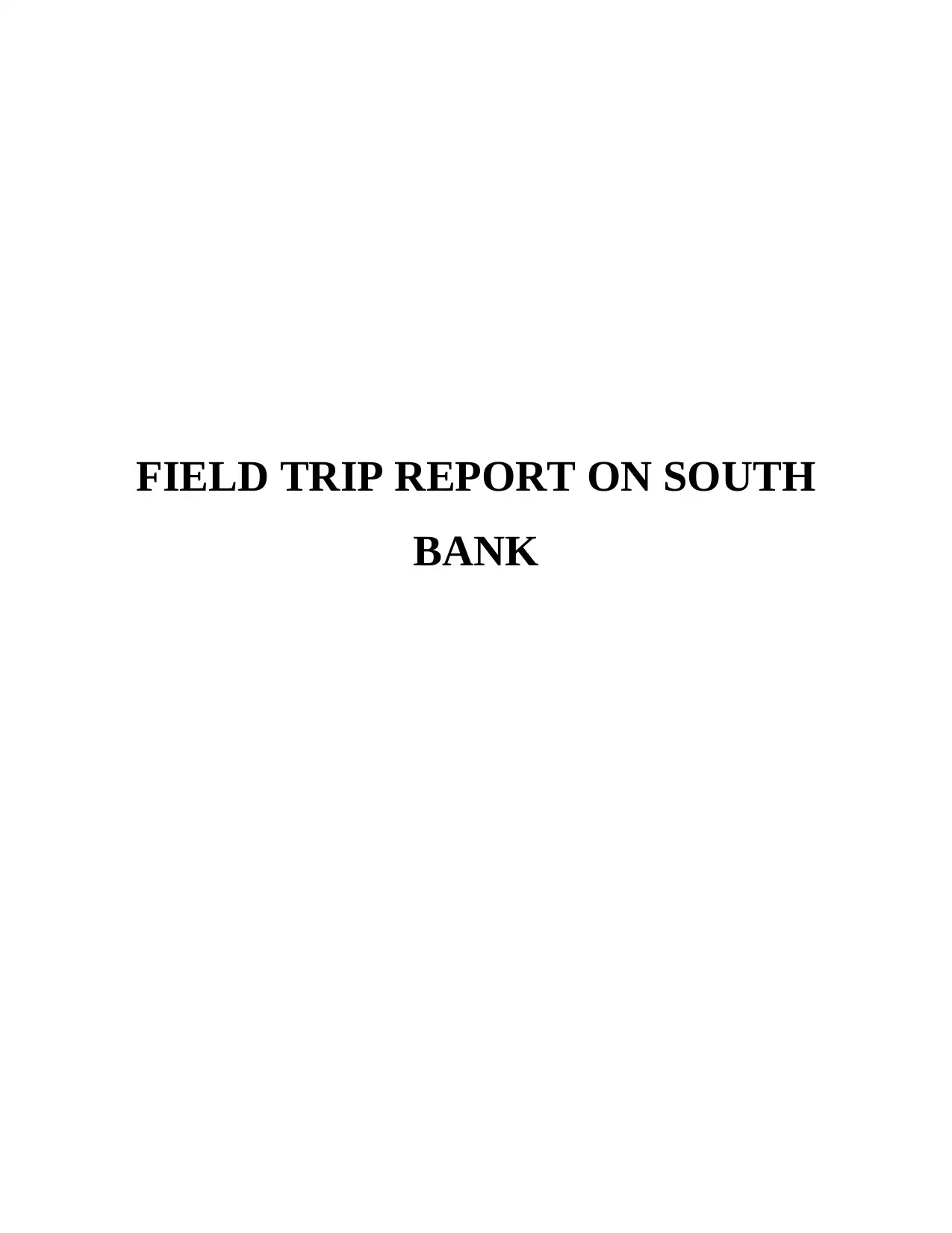
FIELD TRIP REPORT ON SOUTH
BANK
BANK
Paraphrase This Document
Need a fresh take? Get an instant paraphrase of this document with our AI Paraphraser
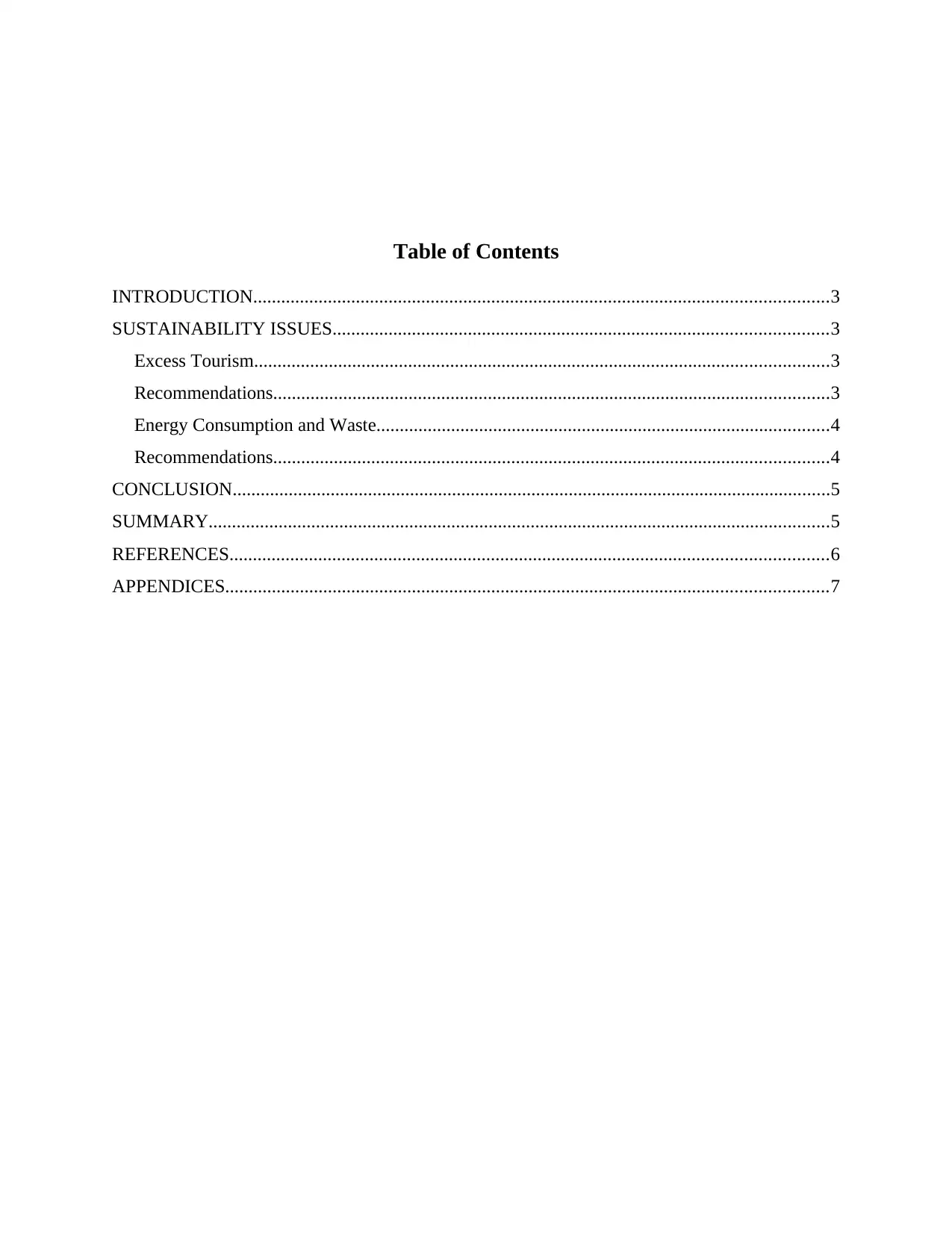
Table of Contents
INTRODUCTION...........................................................................................................................3
SUSTAINABILITY ISSUES..........................................................................................................3
Excess Tourism...........................................................................................................................3
Recommendations.......................................................................................................................3
Energy Consumption and Waste.................................................................................................4
Recommendations.......................................................................................................................4
CONCLUSION................................................................................................................................5
SUMMARY.....................................................................................................................................5
REFERENCES................................................................................................................................6
APPENDICES.................................................................................................................................7
INTRODUCTION...........................................................................................................................3
SUSTAINABILITY ISSUES..........................................................................................................3
Excess Tourism...........................................................................................................................3
Recommendations.......................................................................................................................3
Energy Consumption and Waste.................................................................................................4
Recommendations.......................................................................................................................4
CONCLUSION................................................................................................................................5
SUMMARY.....................................................................................................................................5
REFERENCES................................................................................................................................6
APPENDICES.................................................................................................................................7
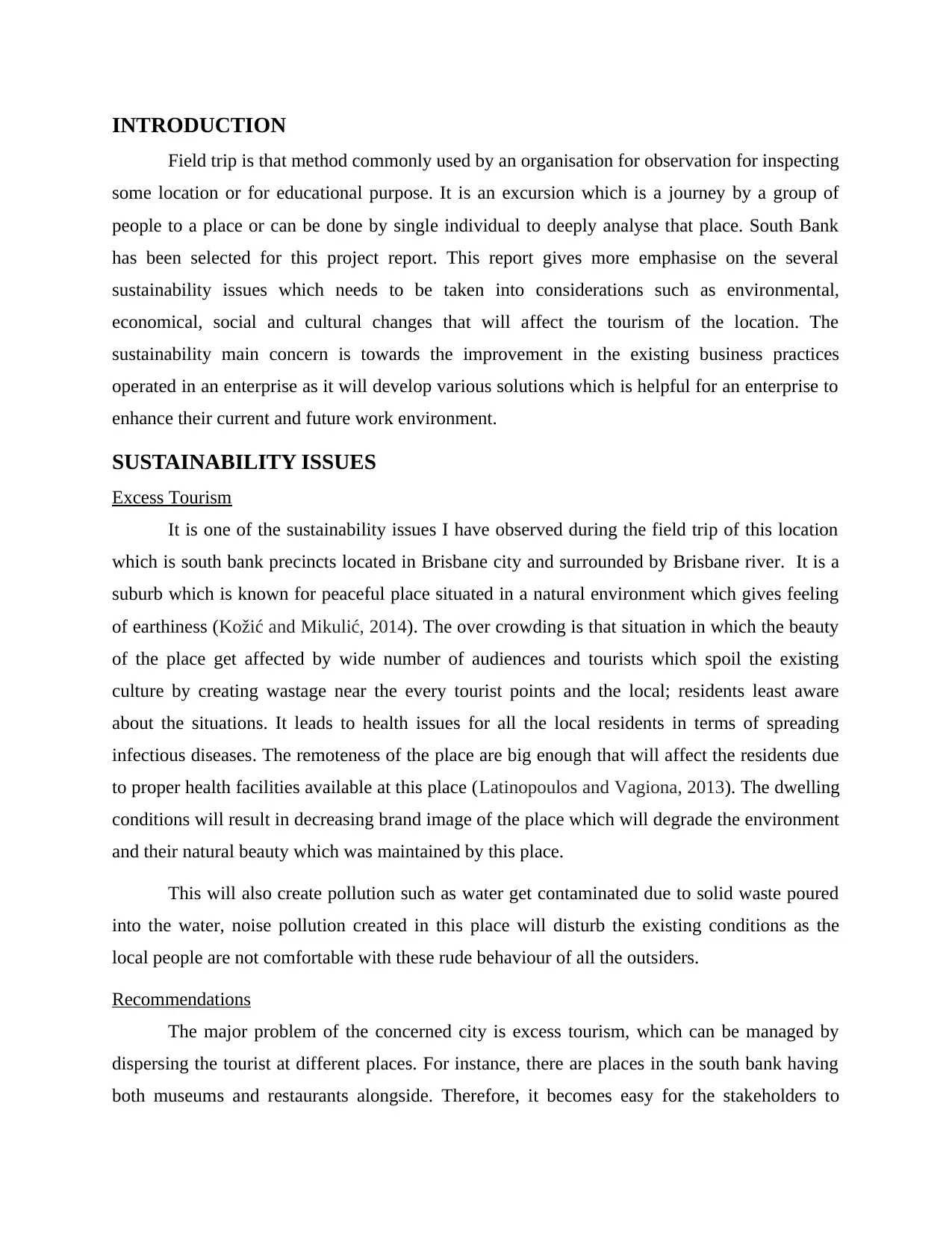
INTRODUCTION
Field trip is that method commonly used by an organisation for observation for inspecting
some location or for educational purpose. It is an excursion which is a journey by a group of
people to a place or can be done by single individual to deeply analyse that place. South Bank
has been selected for this project report. This report gives more emphasise on the several
sustainability issues which needs to be taken into considerations such as environmental,
economical, social and cultural changes that will affect the tourism of the location. The
sustainability main concern is towards the improvement in the existing business practices
operated in an enterprise as it will develop various solutions which is helpful for an enterprise to
enhance their current and future work environment.
SUSTAINABILITY ISSUES
Excess Tourism
It is one of the sustainability issues I have observed during the field trip of this location
which is south bank precincts located in Brisbane city and surrounded by Brisbane river. It is a
suburb which is known for peaceful place situated in a natural environment which gives feeling
of earthiness (Kožić and Mikulić, 2014). The over crowding is that situation in which the beauty
of the place get affected by wide number of audiences and tourists which spoil the existing
culture by creating wastage near the every tourist points and the local; residents least aware
about the situations. It leads to health issues for all the local residents in terms of spreading
infectious diseases. The remoteness of the place are big enough that will affect the residents due
to proper health facilities available at this place (Latinopoulos and Vagiona, 2013). The dwelling
conditions will result in decreasing brand image of the place which will degrade the environment
and their natural beauty which was maintained by this place.
This will also create pollution such as water get contaminated due to solid waste poured
into the water, noise pollution created in this place will disturb the existing conditions as the
local people are not comfortable with these rude behaviour of all the outsiders.
Recommendations
The major problem of the concerned city is excess tourism, which can be managed by
dispersing the tourist at different places. For instance, there are places in the south bank having
both museums and restaurants alongside. Therefore, it becomes easy for the stakeholders to
Field trip is that method commonly used by an organisation for observation for inspecting
some location or for educational purpose. It is an excursion which is a journey by a group of
people to a place or can be done by single individual to deeply analyse that place. South Bank
has been selected for this project report. This report gives more emphasise on the several
sustainability issues which needs to be taken into considerations such as environmental,
economical, social and cultural changes that will affect the tourism of the location. The
sustainability main concern is towards the improvement in the existing business practices
operated in an enterprise as it will develop various solutions which is helpful for an enterprise to
enhance their current and future work environment.
SUSTAINABILITY ISSUES
Excess Tourism
It is one of the sustainability issues I have observed during the field trip of this location
which is south bank precincts located in Brisbane city and surrounded by Brisbane river. It is a
suburb which is known for peaceful place situated in a natural environment which gives feeling
of earthiness (Kožić and Mikulić, 2014). The over crowding is that situation in which the beauty
of the place get affected by wide number of audiences and tourists which spoil the existing
culture by creating wastage near the every tourist points and the local; residents least aware
about the situations. It leads to health issues for all the local residents in terms of spreading
infectious diseases. The remoteness of the place are big enough that will affect the residents due
to proper health facilities available at this place (Latinopoulos and Vagiona, 2013). The dwelling
conditions will result in decreasing brand image of the place which will degrade the environment
and their natural beauty which was maintained by this place.
This will also create pollution such as water get contaminated due to solid waste poured
into the water, noise pollution created in this place will disturb the existing conditions as the
local people are not comfortable with these rude behaviour of all the outsiders.
Recommendations
The major problem of the concerned city is excess tourism, which can be managed by
dispersing the tourist at different places. For instance, there are places in the south bank having
both museums and restaurants alongside. Therefore, it becomes easy for the stakeholders to
⊘ This is a preview!⊘
Do you want full access?
Subscribe today to unlock all pages.

Trusted by 1+ million students worldwide
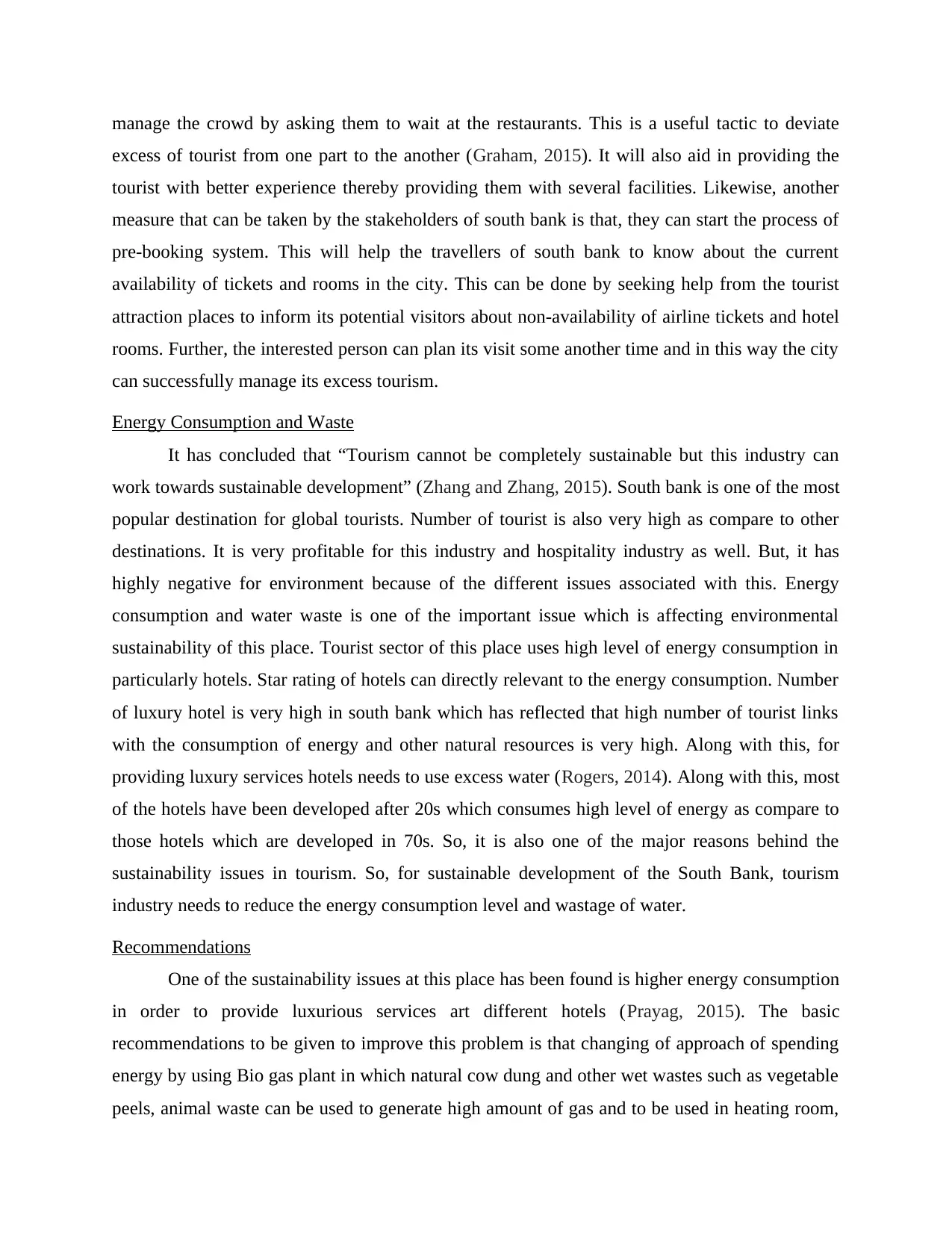
manage the crowd by asking them to wait at the restaurants. This is a useful tactic to deviate
excess of tourist from one part to the another (Graham, 2015). It will also aid in providing the
tourist with better experience thereby providing them with several facilities. Likewise, another
measure that can be taken by the stakeholders of south bank is that, they can start the process of
pre-booking system. This will help the travellers of south bank to know about the current
availability of tickets and rooms in the city. This can be done by seeking help from the tourist
attraction places to inform its potential visitors about non-availability of airline tickets and hotel
rooms. Further, the interested person can plan its visit some another time and in this way the city
can successfully manage its excess tourism.
Energy Consumption and Waste
It has concluded that “Tourism cannot be completely sustainable but this industry can
work towards sustainable development” (Zhang and Zhang, 2015). South bank is one of the most
popular destination for global tourists. Number of tourist is also very high as compare to other
destinations. It is very profitable for this industry and hospitality industry as well. But, it has
highly negative for environment because of the different issues associated with this. Energy
consumption and water waste is one of the important issue which is affecting environmental
sustainability of this place. Tourist sector of this place uses high level of energy consumption in
particularly hotels. Star rating of hotels can directly relevant to the energy consumption. Number
of luxury hotel is very high in south bank which has reflected that high number of tourist links
with the consumption of energy and other natural resources is very high. Along with this, for
providing luxury services hotels needs to use excess water (Rogers, 2014). Along with this, most
of the hotels have been developed after 20s which consumes high level of energy as compare to
those hotels which are developed in 70s. So, it is also one of the major reasons behind the
sustainability issues in tourism. So, for sustainable development of the South Bank, tourism
industry needs to reduce the energy consumption level and wastage of water.
Recommendations
One of the sustainability issues at this place has been found is higher energy consumption
in order to provide luxurious services art different hotels (Prayag, 2015). The basic
recommendations to be given to improve this problem is that changing of approach of spending
energy by using Bio gas plant in which natural cow dung and other wet wastes such as vegetable
peels, animal waste can be used to generate high amount of gas and to be used in heating room,
excess of tourist from one part to the another (Graham, 2015). It will also aid in providing the
tourist with better experience thereby providing them with several facilities. Likewise, another
measure that can be taken by the stakeholders of south bank is that, they can start the process of
pre-booking system. This will help the travellers of south bank to know about the current
availability of tickets and rooms in the city. This can be done by seeking help from the tourist
attraction places to inform its potential visitors about non-availability of airline tickets and hotel
rooms. Further, the interested person can plan its visit some another time and in this way the city
can successfully manage its excess tourism.
Energy Consumption and Waste
It has concluded that “Tourism cannot be completely sustainable but this industry can
work towards sustainable development” (Zhang and Zhang, 2015). South bank is one of the most
popular destination for global tourists. Number of tourist is also very high as compare to other
destinations. It is very profitable for this industry and hospitality industry as well. But, it has
highly negative for environment because of the different issues associated with this. Energy
consumption and water waste is one of the important issue which is affecting environmental
sustainability of this place. Tourist sector of this place uses high level of energy consumption in
particularly hotels. Star rating of hotels can directly relevant to the energy consumption. Number
of luxury hotel is very high in south bank which has reflected that high number of tourist links
with the consumption of energy and other natural resources is very high. Along with this, for
providing luxury services hotels needs to use excess water (Rogers, 2014). Along with this, most
of the hotels have been developed after 20s which consumes high level of energy as compare to
those hotels which are developed in 70s. So, it is also one of the major reasons behind the
sustainability issues in tourism. So, for sustainable development of the South Bank, tourism
industry needs to reduce the energy consumption level and wastage of water.
Recommendations
One of the sustainability issues at this place has been found is higher energy consumption
in order to provide luxurious services art different hotels (Prayag, 2015). The basic
recommendations to be given to improve this problem is that changing of approach of spending
energy by using Bio gas plant in which natural cow dung and other wet wastes such as vegetable
peels, animal waste can be used to generate high amount of gas and to be used in heating room,
Paraphrase This Document
Need a fresh take? Get an instant paraphrase of this document with our AI Paraphraser
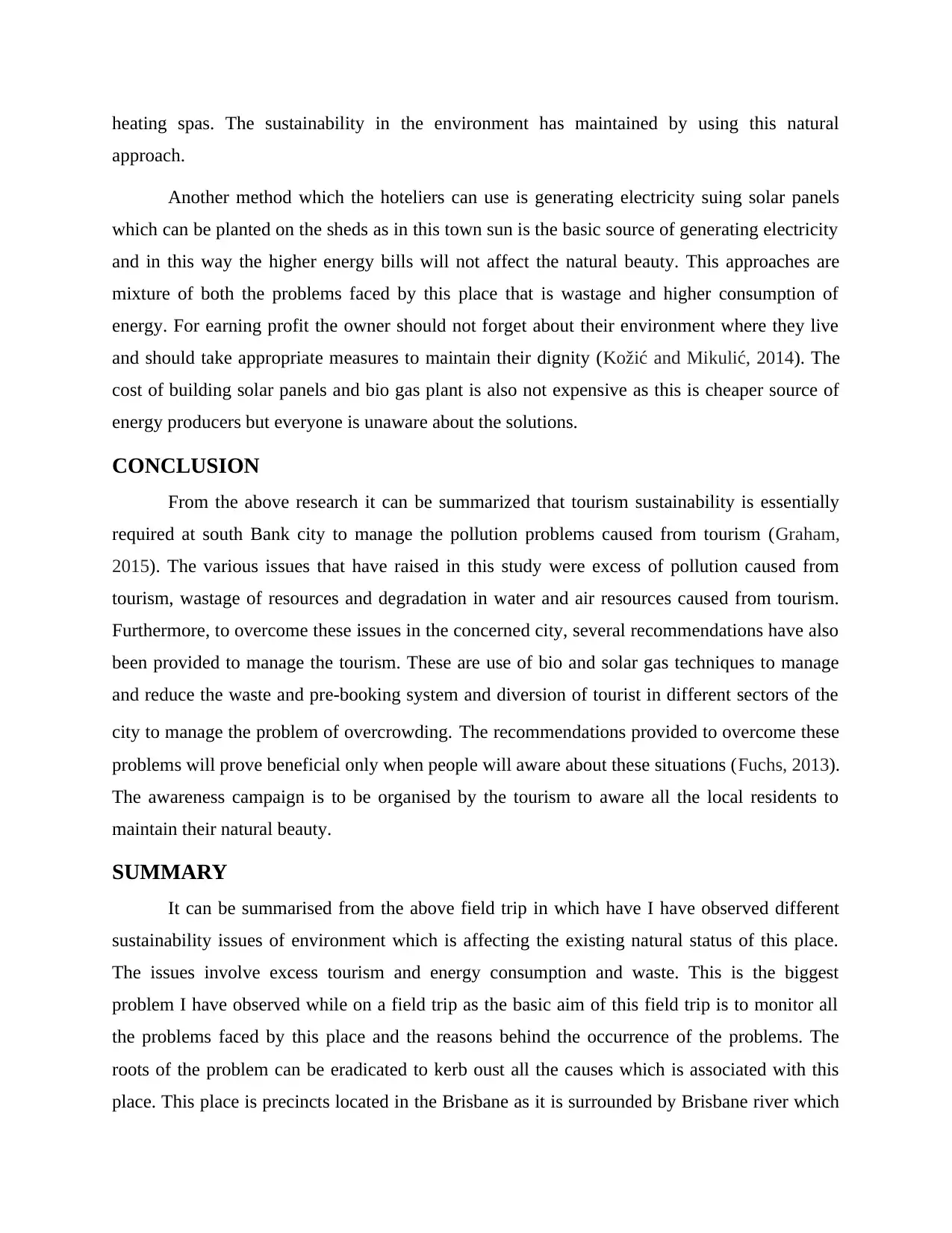
heating spas. The sustainability in the environment has maintained by using this natural
approach.
Another method which the hoteliers can use is generating electricity suing solar panels
which can be planted on the sheds as in this town sun is the basic source of generating electricity
and in this way the higher energy bills will not affect the natural beauty. This approaches are
mixture of both the problems faced by this place that is wastage and higher consumption of
energy. For earning profit the owner should not forget about their environment where they live
and should take appropriate measures to maintain their dignity (Kožić and Mikulić, 2014). The
cost of building solar panels and bio gas plant is also not expensive as this is cheaper source of
energy producers but everyone is unaware about the solutions.
CONCLUSION
From the above research it can be summarized that tourism sustainability is essentially
required at south Bank city to manage the pollution problems caused from tourism (Graham,
2015). The various issues that have raised in this study were excess of pollution caused from
tourism, wastage of resources and degradation in water and air resources caused from tourism.
Furthermore, to overcome these issues in the concerned city, several recommendations have also
been provided to manage the tourism. These are use of bio and solar gas techniques to manage
and reduce the waste and pre-booking system and diversion of tourist in different sectors of the
city to manage the problem of overcrowding. The recommendations provided to overcome these
problems will prove beneficial only when people will aware about these situations (Fuchs, 2013).
The awareness campaign is to be organised by the tourism to aware all the local residents to
maintain their natural beauty.
SUMMARY
It can be summarised from the above field trip in which have I have observed different
sustainability issues of environment which is affecting the existing natural status of this place.
The issues involve excess tourism and energy consumption and waste. This is the biggest
problem I have observed while on a field trip as the basic aim of this field trip is to monitor all
the problems faced by this place and the reasons behind the occurrence of the problems. The
roots of the problem can be eradicated to kerb oust all the causes which is associated with this
place. This place is precincts located in the Brisbane as it is surrounded by Brisbane river which
approach.
Another method which the hoteliers can use is generating electricity suing solar panels
which can be planted on the sheds as in this town sun is the basic source of generating electricity
and in this way the higher energy bills will not affect the natural beauty. This approaches are
mixture of both the problems faced by this place that is wastage and higher consumption of
energy. For earning profit the owner should not forget about their environment where they live
and should take appropriate measures to maintain their dignity (Kožić and Mikulić, 2014). The
cost of building solar panels and bio gas plant is also not expensive as this is cheaper source of
energy producers but everyone is unaware about the solutions.
CONCLUSION
From the above research it can be summarized that tourism sustainability is essentially
required at south Bank city to manage the pollution problems caused from tourism (Graham,
2015). The various issues that have raised in this study were excess of pollution caused from
tourism, wastage of resources and degradation in water and air resources caused from tourism.
Furthermore, to overcome these issues in the concerned city, several recommendations have also
been provided to manage the tourism. These are use of bio and solar gas techniques to manage
and reduce the waste and pre-booking system and diversion of tourist in different sectors of the
city to manage the problem of overcrowding. The recommendations provided to overcome these
problems will prove beneficial only when people will aware about these situations (Fuchs, 2013).
The awareness campaign is to be organised by the tourism to aware all the local residents to
maintain their natural beauty.
SUMMARY
It can be summarised from the above field trip in which have I have observed different
sustainability issues of environment which is affecting the existing natural status of this place.
The issues involve excess tourism and energy consumption and waste. This is the biggest
problem I have observed while on a field trip as the basic aim of this field trip is to monitor all
the problems faced by this place and the reasons behind the occurrence of the problems. The
roots of the problem can be eradicated to kerb oust all the causes which is associated with this
place. This place is precincts located in the Brisbane as it is surrounded by Brisbane river which
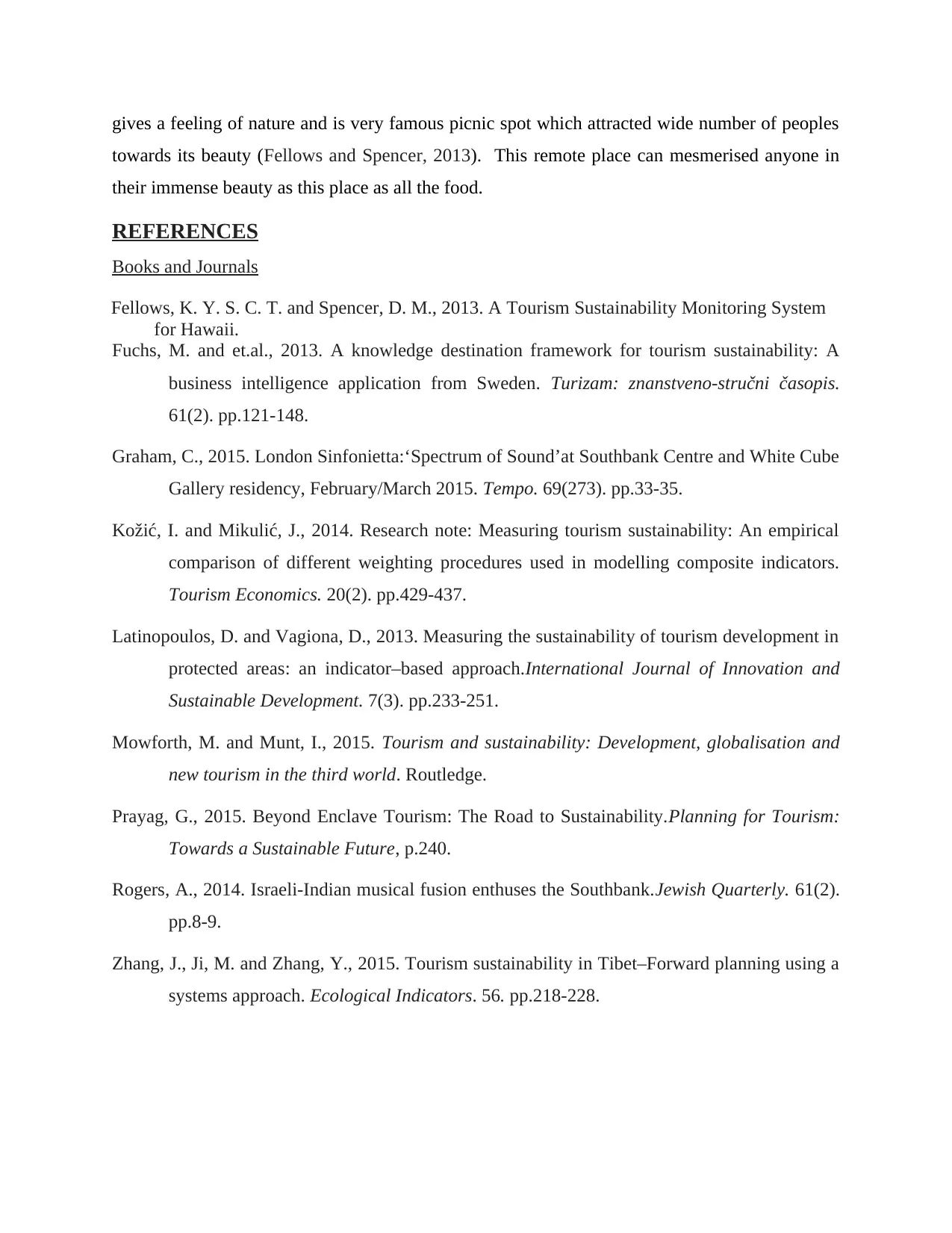
gives a feeling of nature and is very famous picnic spot which attracted wide number of peoples
towards its beauty (Fellows and Spencer, 2013). This remote place can mesmerised anyone in
their immense beauty as this place as all the food.
REFERENCES
Books and Journals
Fellows, K. Y. S. C. T. and Spencer, D. M., 2013. A Tourism Sustainability Monitoring System
for Hawaii.
Fuchs, M. and et.al., 2013. A knowledge destination framework for tourism sustainability: A
business intelligence application from Sweden. Turizam: znanstveno-stručni časopis.
61(2). pp.121-148.
Graham, C., 2015. London Sinfonietta:‘Spectrum of Sound’at Southbank Centre and White Cube
Gallery residency, February/March 2015. Tempo. 69(273). pp.33-35.
Kožić, I. and Mikulić, J., 2014. Research note: Measuring tourism sustainability: An empirical
comparison of different weighting procedures used in modelling composite indicators.
Tourism Economics. 20(2). pp.429-437.
Latinopoulos, D. and Vagiona, D., 2013. Measuring the sustainability of tourism development in
protected areas: an indicator–based approach.International Journal of Innovation and
Sustainable Development. 7(3). pp.233-251.
Mowforth, M. and Munt, I., 2015. Tourism and sustainability: Development, globalisation and
new tourism in the third world. Routledge.
Prayag, G., 2015. Beyond Enclave Tourism: The Road to Sustainability.Planning for Tourism:
Towards a Sustainable Future, p.240.
Rogers, A., 2014. Israeli-Indian musical fusion enthuses the Southbank.Jewish Quarterly. 61(2).
pp.8-9.
Zhang, J., Ji, M. and Zhang, Y., 2015. Tourism sustainability in Tibet–Forward planning using a
systems approach. Ecological Indicators. 56. pp.218-228.
towards its beauty (Fellows and Spencer, 2013). This remote place can mesmerised anyone in
their immense beauty as this place as all the food.
REFERENCES
Books and Journals
Fellows, K. Y. S. C. T. and Spencer, D. M., 2013. A Tourism Sustainability Monitoring System
for Hawaii.
Fuchs, M. and et.al., 2013. A knowledge destination framework for tourism sustainability: A
business intelligence application from Sweden. Turizam: znanstveno-stručni časopis.
61(2). pp.121-148.
Graham, C., 2015. London Sinfonietta:‘Spectrum of Sound’at Southbank Centre and White Cube
Gallery residency, February/March 2015. Tempo. 69(273). pp.33-35.
Kožić, I. and Mikulić, J., 2014. Research note: Measuring tourism sustainability: An empirical
comparison of different weighting procedures used in modelling composite indicators.
Tourism Economics. 20(2). pp.429-437.
Latinopoulos, D. and Vagiona, D., 2013. Measuring the sustainability of tourism development in
protected areas: an indicator–based approach.International Journal of Innovation and
Sustainable Development. 7(3). pp.233-251.
Mowforth, M. and Munt, I., 2015. Tourism and sustainability: Development, globalisation and
new tourism in the third world. Routledge.
Prayag, G., 2015. Beyond Enclave Tourism: The Road to Sustainability.Planning for Tourism:
Towards a Sustainable Future, p.240.
Rogers, A., 2014. Israeli-Indian musical fusion enthuses the Southbank.Jewish Quarterly. 61(2).
pp.8-9.
Zhang, J., Ji, M. and Zhang, Y., 2015. Tourism sustainability in Tibet–Forward planning using a
systems approach. Ecological Indicators. 56. pp.218-228.
⊘ This is a preview!⊘
Do you want full access?
Subscribe today to unlock all pages.

Trusted by 1+ million students worldwide
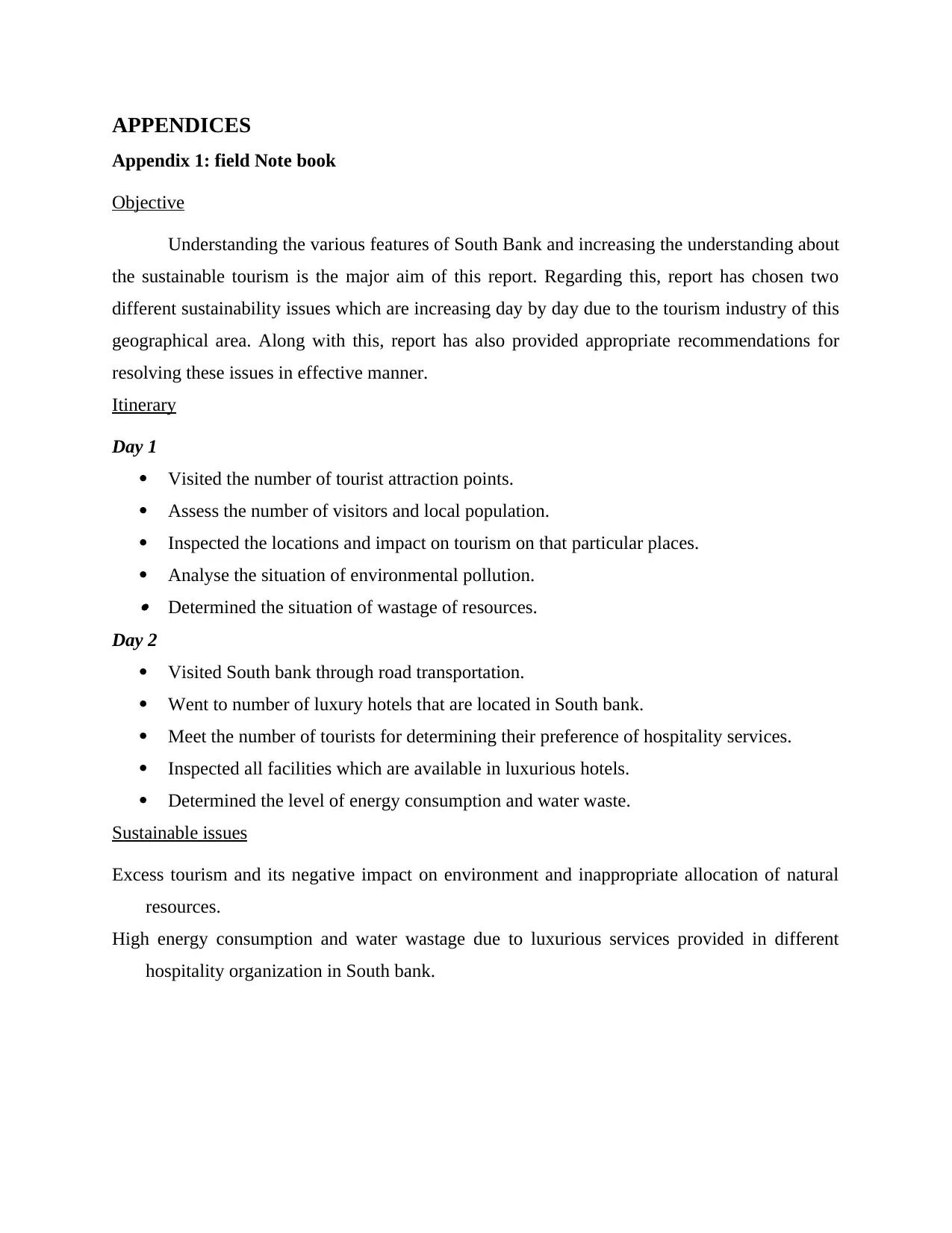
APPENDICES
Appendix 1: field Note book
Objective
Understanding the various features of South Bank and increasing the understanding about
the sustainable tourism is the major aim of this report. Regarding this, report has chosen two
different sustainability issues which are increasing day by day due to the tourism industry of this
geographical area. Along with this, report has also provided appropriate recommendations for
resolving these issues in effective manner.
Itinerary
Day 1
Visited the number of tourist attraction points.
Assess the number of visitors and local population.
Inspected the locations and impact on tourism on that particular places.
Analyse the situation of environmental pollution. Determined the situation of wastage of resources.
Day 2
Visited South bank through road transportation.
Went to number of luxury hotels that are located in South bank.
Meet the number of tourists for determining their preference of hospitality services.
Inspected all facilities which are available in luxurious hotels.
Determined the level of energy consumption and water waste.
Sustainable issues
Excess tourism and its negative impact on environment and inappropriate allocation of natural
resources.
High energy consumption and water wastage due to luxurious services provided in different
hospitality organization in South bank.
Appendix 1: field Note book
Objective
Understanding the various features of South Bank and increasing the understanding about
the sustainable tourism is the major aim of this report. Regarding this, report has chosen two
different sustainability issues which are increasing day by day due to the tourism industry of this
geographical area. Along with this, report has also provided appropriate recommendations for
resolving these issues in effective manner.
Itinerary
Day 1
Visited the number of tourist attraction points.
Assess the number of visitors and local population.
Inspected the locations and impact on tourism on that particular places.
Analyse the situation of environmental pollution. Determined the situation of wastage of resources.
Day 2
Visited South bank through road transportation.
Went to number of luxury hotels that are located in South bank.
Meet the number of tourists for determining their preference of hospitality services.
Inspected all facilities which are available in luxurious hotels.
Determined the level of energy consumption and water waste.
Sustainable issues
Excess tourism and its negative impact on environment and inappropriate allocation of natural
resources.
High energy consumption and water wastage due to luxurious services provided in different
hospitality organization in South bank.
Paraphrase This Document
Need a fresh take? Get an instant paraphrase of this document with our AI Paraphraser
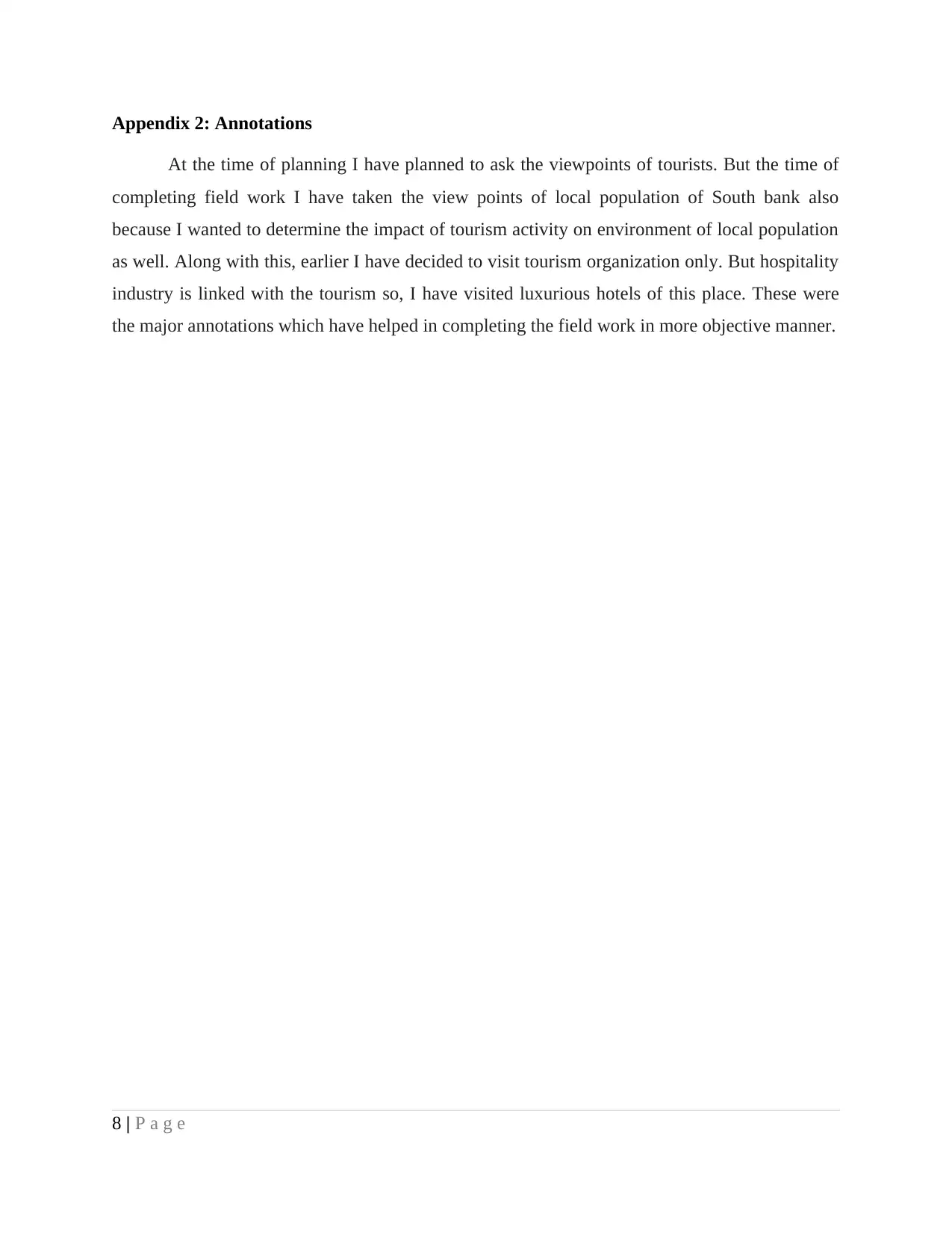
Appendix 2: Annotations
At the time of planning I have planned to ask the viewpoints of tourists. But the time of
completing field work I have taken the view points of local population of South bank also
because I wanted to determine the impact of tourism activity on environment of local population
as well. Along with this, earlier I have decided to visit tourism organization only. But hospitality
industry is linked with the tourism so, I have visited luxurious hotels of this place. These were
the major annotations which have helped in completing the field work in more objective manner.
8 | P a g e
At the time of planning I have planned to ask the viewpoints of tourists. But the time of
completing field work I have taken the view points of local population of South bank also
because I wanted to determine the impact of tourism activity on environment of local population
as well. Along with this, earlier I have decided to visit tourism organization only. But hospitality
industry is linked with the tourism so, I have visited luxurious hotels of this place. These were
the major annotations which have helped in completing the field work in more objective manner.
8 | P a g e
1 out of 8
Related Documents
Your All-in-One AI-Powered Toolkit for Academic Success.
+13062052269
info@desklib.com
Available 24*7 on WhatsApp / Email
![[object Object]](/_next/static/media/star-bottom.7253800d.svg)
Unlock your academic potential
Copyright © 2020–2026 A2Z Services. All Rights Reserved. Developed and managed by ZUCOL.





